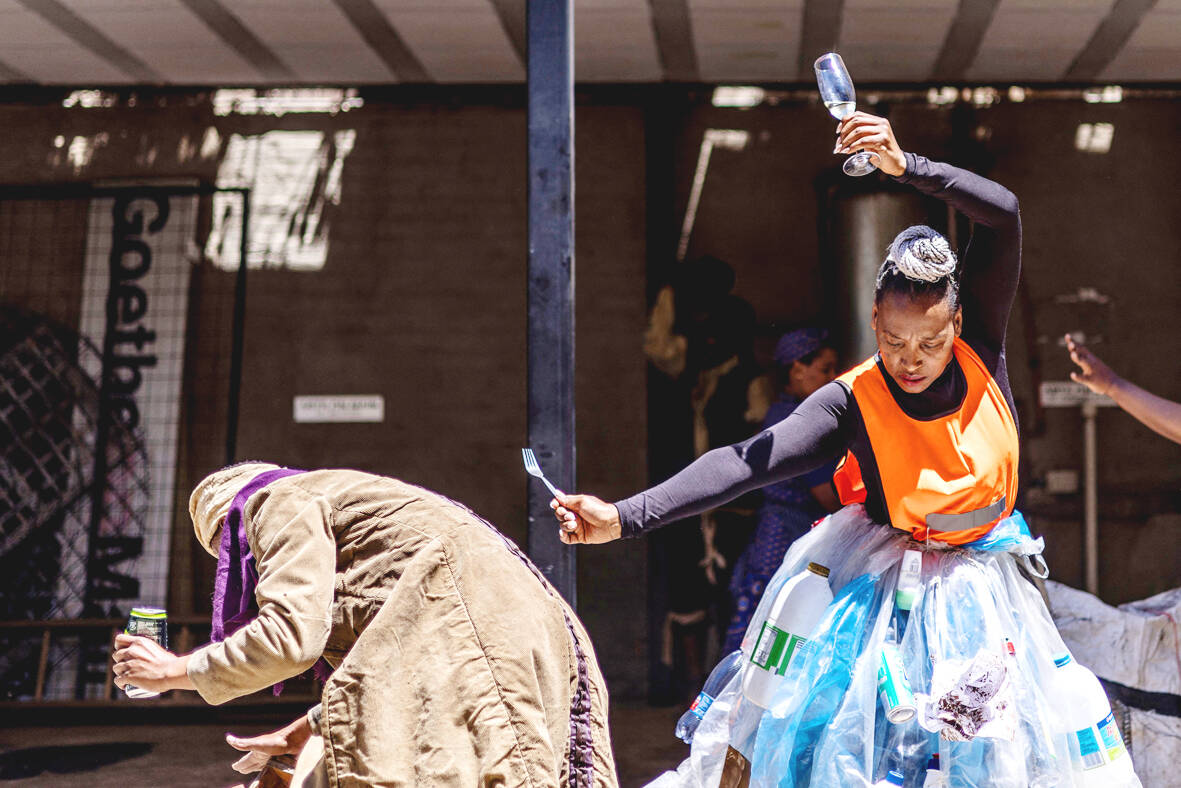At first glance it looks like an ordinary street parade, with marching minstrels, baton-twirling majorettes, painted faces and glittering costumes careering down a battered, rundown Johannesburg street.
A small boy in a torn T-shirt takes in the sunny scene, eyes wide open and fists on his hips. He was one of several children following the parade, unsupervised and fascinated by the festivities in the gritty neighborhood.
But unlike the traditional minstrel parades in South Africa, this procession was joined by some of the poorest of the poor — the “recyclers” who rummage through garbage in hopes of finding something that will earn a few pennies.

Photo: AFP
The display, titled “No Man’s Land,” was a creation of The Centre for the Less Good Ideas, co-founded by William Kentridge, a South African artist famous for his drawings and animated films.
The bushy-browed 68-year-old is present, wearing his customary white shirt and Panama hat, amusedly observing the hustle and bustle, the whistles and shouts.
It was choreographer and dancer Sello Pesa who came up with the idea of the carnival procession to celebrate the 10th season for the center, whose headquarters are in the Maboneng district — the depressed center of South Africa’s economic capital.
The artists got ready in the courtyard of this former industrial complex, made up of small brick buildings now housing performance halls and workshops.
For the parade, Pesa enlisted the recyclers, who normally focus on searching for items like cardboard, scrap metal and plastics to earn a meager living.
“My idea is to look at ignored societies that feed art, exploring how they can meet in public space. To bring what is thrown away into a pristine, posh area,” the trained dancer said.
“Last time there were Congolese men who work as security guards or parking attendants in the street. This time the recyclers mostly come from Lesotho,” he said. “I meet them on the street, when I park my car. They tell me their stories.”
Suddenly, a fairy appears in a stunning hand-sewn dress, evoking the fluorescent vests worn by garbage collectors, extended by a plastic skirt covered with empty bottles —milk, deodorant, toiletries — and crumpled paper. It’s as if the contents of a garbage can had been poured over her head.
“This is what the planet is going through. It’s hot under my skirt. Like the planet,” the dancer, 39-year-old Teresa Phuti Mojela, says.
She taps a fork on a wine glass, getting everyone’s attention as she signals the start of the fanfare.
The garbage scavengers sing a cappella, clapping their hands, using inflated bags as percussion and boomboxing with their mouths.
Residents, passers-by and other onlookers raise a cheer as the band takes to the streets, marching behind a pickup truck loaded with a loudspeaker.
At the front, a feather-capped minstrel rolls his eyes and grimaces to amuse the children.
He throws his stick in the air, deftly retrieves it and sways to the beat. The scene is reminiscent of a Mardi Gras parade in New Orleans.
A wave of energy and noisy joy threads its way through the poor, ramshackle and often dangerous streets. Several police cars flank the mad procession as it passes small grocery stores and braziers of grilled meat on the sidewalk.
A fleeting look of joy crosses the faces of the crowd, who take a moment’s pause from their everyday lives.

On April 26, The Lancet published a letter from two doctors at Taichung-based China Medical University Hospital (CMUH) warning that “Taiwan’s Health Care System is on the Brink of Collapse.” The authors said that “Years of policy inaction and mismanagement of resources have led to the National Health Insurance system operating under unsustainable conditions.” The pushback was immediate. Errors in the paper were quickly identified and publicized, to discredit the authors (the hospital apologized). CNA reported that CMUH said the letter described Taiwan in 2021 as having 62 nurses per 10,000 people, when the correct number was 78 nurses per 10,000

As we live longer, our risk of cognitive impairment is increasing. How can we delay the onset of symptoms? Do we have to give up every indulgence or can small changes make a difference? We asked neurologists for tips on how to keep our brains healthy for life. TAKE CARE OF YOUR HEALTH “All of the sensible things that apply to bodily health apply to brain health,” says Suzanne O’Sullivan, a consultant in neurology at the National Hospital for Neurology and Neurosurgery in London, and the author of The Age of Diagnosis. “When you’re 20, you can get away with absolute

May 5 to May 11 What started out as friction between Taiwanese students at Taichung First High School and a Japanese head cook escalated dramatically over the first two weeks of May 1927. It began on April 30 when the cook’s wife knew that lotus starch used in that night’s dinner had rat feces in it, but failed to inform staff until the meal was already prepared. The students believed that her silence was intentional, and filed a complaint. The school’s Japanese administrators sided with the cook’s family, dismissing the students as troublemakers and clamping down on their freedoms — with

As Donald Trump’s executive order in March led to the shuttering of Voice of America (VOA) — the global broadcaster whose roots date back to the fight against Nazi propaganda — he quickly attracted support from figures not used to aligning themselves with any US administration. Trump had ordered the US Agency for Global Media, the federal agency that funds VOA and other groups promoting independent journalism overseas, to be “eliminated to the maximum extent consistent with applicable law.” The decision suddenly halted programming in 49 languages to more than 425 million people. In Moscow, Margarita Simonyan, the hardline editor-in-chief of the